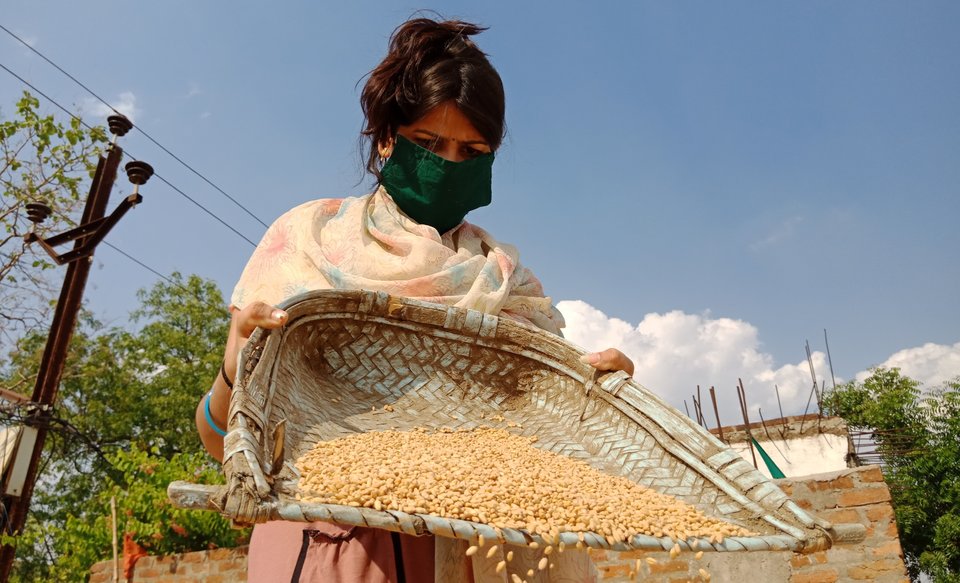Our Covid-19 response recognised our responsibility to move quickly to address the growing crisis and deliver critical support rapidly and at scale to our most impacted partners around the world.
Working in close dialogue with partners, our response focussed not just on the immediate emergency but also on the structural issues of injustice brought into sharp focus by the pandemic.
Our immediate reaction was to increase our existing emergency fund to EUR 3.3 million to support partners when their own safety and security was at risk.
This ensured our partners could cover the basic operating expenses they incurred during the onset of the pandemic so none had to cease operation. The fund also enabled them to give crucial assistance to those in need, and more than 65% of partners used Laudes Foundation funds to provide necessities to the people and communities they serve.
Partners, prevented from doing their work on the ground, and in many cases from continuing their daily work at all, also needed more flexibility in how we work together. Our team consulted with each partner to evaluate and adapt deadlines and reporting obligations as needed.
The 'Ask the Expert’ platform, launched in May 2020, also allowed us to go beyond offering only financial support. It connected our partners around the world with 30 specialist consultants who supported in important areas such as strategy redesign, leadership, management, IT and communications.
Our approach is in line with the Council on Foundation’s Philanthropy Commitment, which Laudes Foundation has signed, together with 803 other foundations, to hold ourselves accountable to be a good funder, increasing our flexibility and offering general operating support in response to this global emergency.
our response in numbers
The lessons
of the
pandemic
We are continuing our Covid-19 response by providing emergency relief to partners affected by the pandemic’s deadly second wave, sweeping through South Asia and Brazil.
We are continuing our Covid-19 response by providing emergency relief to partners affected by the pandemic’s deadly second wave, sweeping through South Asia and Brazil. Our support to our partners addresses both the pandemic’s short-term impact and the long-standing structural issues it has exposed, and we have already learned a lot about what works (and what doesn’t):
Collaborative approach
Our programmatic teams worked closely with our partners and listened to their needs, ensuring the design of the Covid-19 emergency fund met their immediate requirements, while aligning with our long-term strategic focus on systems change.
Needs are immediate
Whether they are serving garment workers in South Asia or cotton farmers in India, the main priority of our partners in moments of emergency is to keep their own lights on and to provide critical and immediate support to the communities they serve. Our ability to act quickly and nimbly in response to both these urgent needs was essential.
Funder coordination
Although our emergency fund leveraged a financial response beyond our own resources, better coordination with other funders could have amplified the impact of our fund.

Partner
spotlight
ASA
Click to edit...
When the Covid-19 pandemic first hit rural India at the start of 2020, long-term partner Action for Social Advancement (ASA), saw that small-scale cotton farmers were struggling.
Market uncertainty and disruption of logistics made them financially vulnerable. Their financial situation worsened even further as family members returned to their rural communities after losing their jobs in the cities.
With the rapid release of funds from our Covid-19 emergency response, ASA took immediate action to help farmers cope with the initial crisis and build resilience for the next growing season.
ASA’s network of more than 300 Farmer Producer Organisations (FPOs), community-level groups that enable farmers to access markets collectively, helped farmers buy materials at 2019 prices, but that still involved significant financial risk. Using EUR 245,000 of emergency funding from Laudes Foundation as initial collateral, ASA assembled a financing package of over EUR 1.5 million from various stakeholders to offer interest-free, peer-to-peer loans to farmers.
This funding:
Brought together investments from ASA, the NGO Range De, the FPOs themselves, a fundraising telethon, and working capital from three financial institutions.
Provided a lower cost of capital and helped to strengthen the FPOs for longer-term financial viability.
Allowed ASA to help nearly 56,000 smallholder farmers and their families access EUR 8.3 million in wage funding via the Mahatma Gandhi National Rural Employment Guarantee Act (MNREGA), which provides migrant and seasonal workers with assured income while the economy recovers.

NEXT
2020
in
numbers